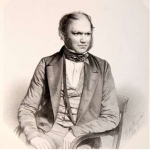Fridays are the worst, from a teacher’s perspective, and Mondays are great. Students start out the week full of enthusiasm and slowly deflate, so today I’ve only got 50% attendance…and that’s typical. I try to pack Mondays with all the deep information, while on Fridays I try to do something different.
We’ve been talking about Darwin this week. I’ve given them an in-class exercise to browse through the Darwin project and begin to put together a short essay. Here are their instructions.
In your next essay, you’re going to be a real historian: I want you to read a few samples of primary historical references from Charles Darwin, and interpret and explain what he is writing about.
The Darwin Correspondence Project (https://www.darwinproject.ac.uk/) is a massive archive of letters to and from Charles Darwin, containing about 15,000 documents that have all been indexed and made publicly available. I want you to dive into this pile of letters, pluck out a few, and read them carefully. You may have to do additional research to figure out who these long dead people were, but the Darwin Project has actually done a lot of that work for you.
Write a 750 word essay that explains the context and meaning of the letters you choose. Unlike most scientific writing, this kind of essay encourages quoting your source — but don’t use up more than 250 words in direct quotes.
You get to choose the topic of the letters. Some might contain heavy scientific arguments, others might be friendly chit-chat, some are questions about that flower you were supposed to mail to me. They’re all good and interesting! Peek into the mind of a famous scientist, and you’ll find both deep revelations and mundane conversation.
In class: before you go, summarize to the group what you intend to write about, or tell us something interesting that you found.
I’m in class, working in parallel with them, and occasionally interrupting to get an idea of what they’re focusing on. I was most interested in Darwin’s “fool experiments“. These were experiments where you figured that it would never work, or that the answer would be obvious, but you go ahead and do the experiment anyways.
‘I love fools’ experiments. I am always making them’, was one of the most interesting things the zoologist E. Ray Lankester ever heard Darwin say. ‘A great deal might be written as comment on that statement’, Lankester later recorded, but he limited himself to stating that ‘the thoughts which it suggests may be summed up by the proposition that even a wise experiment when made by a fool generally leads to a false conclusion, but that fools’ experiments conducted by a genius often prove to be leaps through the dark into great discoveries.’
That’s a really good idea. I should go do a fool’s experiment this afternoon, maybe I’ll be surprised.
My students are right now digging into Darwin’s religious beliefs, his love life, his speculations about the age of the earth, and are going to give me the details next week. This should be fun.



I have always thought of Hobbes as the opposite of the experimentalists. I imagine him saying, “You don’t have to do that (experiment) because I can DO IT IN MY HEAD.”
Fools experiments let you rattle the base of the knowledge pyramid and bypass your own pressumptions. Always a good way to sharpen the saw from time to time.
Any chance you could ask a student or students if you could share their essays with us? Of course, you wouldn’t identify them by name.
Oh PZ I wish I had had you for a lecturer, a pity you were born 40 years too late! My evolution/ genetics lecturers were good, but very conventional text book teachers. A study of Darwin’s correspondence would have been wonderful for me.
Always fun to search the Darwin correspondence. I just did a quick dive and note that one of his correspondents was a resident of Minnesota, Ignatius Donnelly. Unfortunately Donnelly was not a scientist (see Wikipedia). Another wrote twice from Duluth, Minnesota, H. A. Head, who seems to have been a wanderer (and an avowed non-Christian) and among the poorer of the people Darwin exchanged letters with.
A search on spiders yields Darwin’s earliest mention in the letters with “Spiders & the adjoining tribes have perhaps given me from their novelty the most pleasure.— I think I have already taken several new genera” (letter to William Darwin Fox, a second cousin and college friend, from Rio de Janeiro in May 1832
I wouldn’t mind seeing another episode of, “Camera on a Long Prod Down a Hole in the Ground Videos” (That was way too long for me to try to hyphenate).
The prod is right outside my office door. I’ve thought about it — it’s colder now, maybe the yellowjackets will have calmed down.
I don’t understand the drop in attendance as the week moves along. I always loved going to my classes and never carried below 21 credits a term. (I’m not that hard a worker, nor particularly gifted). Heck, kids, this is your education you’re missing!
Your instructions to the students are eerily similar to typical detailed “prompts” given to Large Language Models. That’s just how people set up Claude or GPT4 to generate text — “You are a , read , write “. Probably get results faster than you did, though.
In the previous, I used angle brackets to indicate meta-text, and they were swallowed. Sorry. Prompt skeleton should be “You are a (role to play), read (this material), write (format and length)”